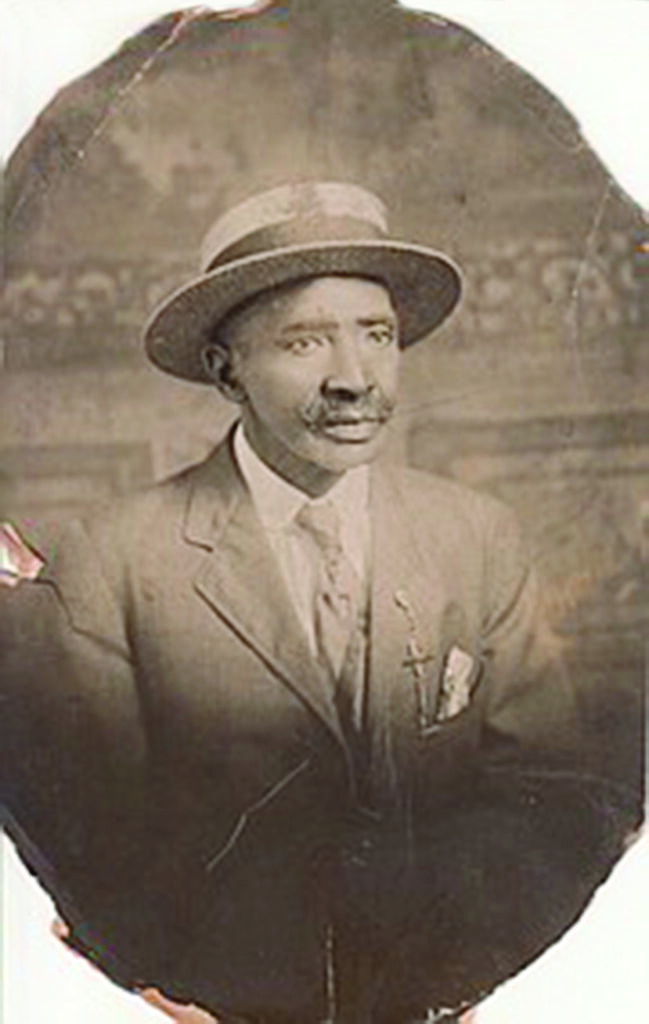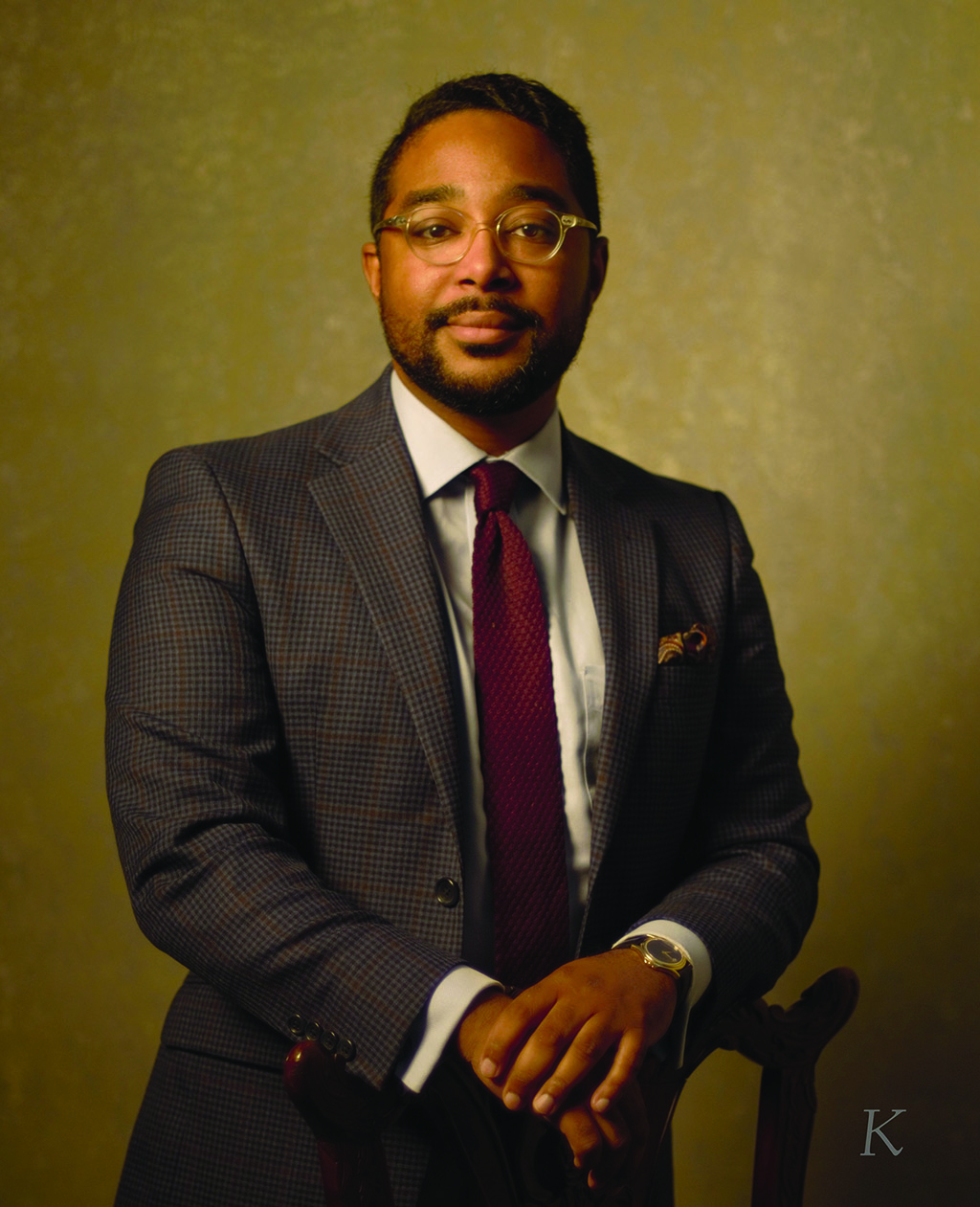A Middleburg Slave’s Journey to Freedom and the American Dream

Middleburg Life Staffer Recounts the Story of His Ancestor
Story by Heidi Baumstark
Roots. They remain hidden, but their fruits are revealing.
For Christian Bentley, he is proud of his roots — and for good reason. Because of the positive choices his ancestors made generations ago, a solid groundwork was laid, paving the way for a promising future. Today, he is the sales and account manager for Greenhill Media, publishers of Middleburg Life magazine.
In the Alexandria Gazette Packet (The Connection Newspapers), a Sept. 4, 2018 article titled, “Richard W. Bentley: 19th and 20th Century Businessman,” featured Bentley’s relatives. Written by historian, genealogist, author, and columnist Char McCargo Bah, it chronicled the life of Richard W. Bentley, Christian’s great, great, great, great grandfather, born a slave in 1850 in Middleburg. His parents were William and Fannie (records also show Fanny) Bentley. When the Civil War broke out in 1861, Richard was only 11 years old.
“They were slaves on a Loudoun County plantation,” Christian said. “My great, great aunt, who I call Aunt Dorothea, is now 97 years old, and was the granddaughter of Richard W. Bentley. She always said that everyone — black, white, young, and old — called him ‘Mr. Bentley.’ He was respected because of the way he carried himself and treated people.”
Bah also has a blog titled, “The Other Alexandria,” that includes stories about a different side of this popular port city on the Potomac River that was founded in 1749.

(Richard W. Bentley (1850-1939). Photo permission from Christian Bentley.)
“Like Char’s ‘The Other Alexandria’ blog, I would say there is also ‘another Middleburg,’” Christian said. “Yes, Middleburg is known throughout the world for foxhunting and horse country, but there’s a whole other community of people who helped start and maintain those traditions, and kept those farms running.”
Today, people flock to Middleburg for its pristine beauty, historical interest, and wide, open spaces. But during wartime, at least one community of people fled Loudoun in search of freedom. It’s time we bring those stories out of the shadows.
“Many African-American families have not dealt with their history of ancestors in slavery; it’s not an easy topic to discuss, but a necessary one to share,” Bah said. “Because to know one’s roots makes you even more proud of your family’s achievements.”
Consider the Bentleys. During the Civil War, young Richard escaped Loudoun with his mother, Fannie, and his sister. They ran away to Alexandria and were considered contraband of the Union army.
“They lived in a shack until Richard could be enrolled in school,” Christian said. “But then he had to work.”
But why Alexandria? Because of its prime location directly across the Potomac River — within eyesight of the city of Washington — it provided wider opportunities for African Americans since it was so close to Union territory. On May 23, 1861, voting citizens of Virginia approved the April 17, 1861 Ordinance of Secession, which declared that Virginia had repealed its ratification of the United States, and therefore, officially joined the Confederacy. But the next morning on May 24, Union forces arrived in Alexandria, marking the beginning of a four-year occupation of this Virginia city, now a part of the Confederate States of America (CSA). Alexandria would become the longest Union-occupied city in the entire Confederacy. And African-Americans began to settle there.
As a major transportation hub by water and by rail, this seaport town was the perfect location to dispatch supplies and troops. The city was flooded with wounded soldiers from both sides of the conflict, military personnel, civilians, nurses, and doctors, plus a growing population of escaped slaves attempting some type of freedom and employment. Escapees were labeled “contraband” and were essentially refugees. It became the new destination of former slaves — like the Bentleys — who made Alexandria their home.
According to Bah, at the end of the Civil War in 1865, Richard was 15, and contracted himself as a farm laborer to Henry and Amanda Brown in West Bloomfield, a town in Ontario County in New York. Many former slaves contracted themselves out for work during, and shortly after, the war. When his contract ended, he returned to Alexandria in 1870.
“Richard worked and worked, and saved and saved; eventually, he purchased property on 315 N. Patrick Street in Alexandria,” Christian said. With earnings from his job as a railroad porter and farm laborer, he purchased his first land parcel in 1873. The Jan. 4, 1873 Alexandria Gazette states the lot on “Patrick st, between Queen and Princess, 25 feet by 118 ft. sold by Wm Gregory to Richard Bentley, for $120.”
Two years later, on June 24, 1875, he married Susan Craig in Alexandria and the couple lived at 315 N. Patrick Street where they raised 10 children: Laura, Lula, Raymond, William, Nettie, Mabel, Cora, Morrison, Frederick, and Lewis.
Bah’s article stated that at a young age, Richard knew what he wanted to accomplish. Each job prepared him for his lifetime goal of owning a business and managing his properties. In his lifetime, he was a railroad porter, farm laborer, hotel waiter, carpenter, store owner (coal and wood), grocery store owner, merchant, property owner, and a builder. In fact, he built his house at 315 N. Patrick, and a second one on 313 N. Patrick, using railroad boards. Over several decades, these houses were renovated to meet current standards. He was a multi-talented person and a businessman.
“You could call him a serial entrepreneur,” Christian said. “He was a hustler. He also owned a tractor supply store in Alexandria.” He would eventually own three houses: 313, 315, and 317 N. Patrick Street and they stayed in the family until recently.
“Chance and opportunity — what people of color did not have,” Christian said. “But Mr. Bentley made his own chance and opportunity because certainly none was given to him.”

Christian Bentley, photo by Nancy Milburn Kleck Fine Art & Photography LLC.
The Bentleys provided a middle-class life for their family. Bah’s article stated that Richard was one of the few Alexandria African Americans who had a car in the early 1900s. The last vehicle he owned was a five-passenger 1923 Buick, Model 23-47 Sedan. Their sons attended Snowden School for Boys and the daughters attended Hallowell School for Girls, which were the first public schools for black children in Alexandria. (In 1920, the Snowden and Hallowell schools were consolidated into the Parker-Gray School, now gone, but in its place is the Charles Houston Recreation Center at 901 Wythe Street.) Some of their children also became entrepreneurs. Christian’s mother came from the Parker and Dogan families who were devout Catholics and helped start the first black Catholic church, Saint Joseph Catholic Church at 711 N. Columbus Street in Alexandria, established in 1915. The Bentleys, Parkers, and Dogans were instrumental in forming this church, about half a mile from Richard’s house at 315 N. Patrick Street.
“We all still worship there, including Aunt Dorothea,” Christian said. “So basically, I’m related to half of the church.”
On May 2, 1919, Richard’s wife, Susan Craig Bentley, died. Richard lived for another 20 years and died on April 18, 1939. At the time of Bah’s article in 2018, Richard had three living grandchildren: Dorothea, Teresa, and Frankie. He has many great grandchildren, including Lynnwood Campbell and Howard Dishman, Sr.
Bah wrote of how proud Howard Dishman, Sr. was of his great grandfather’s achievements and “thanks his ‘Poppa’ for leaving his family a great legacy.”
“This is actually my family,” Christian said. “We talk about slavery like it was so long ago, but there’s still a connection today. It’s soul riveting to speak to my Aunt Dorothea — this relative whose grandfather was a runaway slave. It’s important we start telling the true story of history. I grew up in the Mount Vernon area of Alexandria and learned all about Washington’s estate. But when you consider who built it and what happened there … it makes you think.”
To illustrate the confusion around records for African Americans, Bah provided Richard’s death certificate which clearly shows he was born in “Middleburg” and died April 18, 1939 from “disease of heart,” and his address as 315 N. Patrick Street in Alexandria. But for his age, the certificate shows “74?” (with the question mark), implying uncertainty. Next to “birth date,” the entry is blank.
“On Richard’s death certificate, a relative who did not know his exact age provided the information,” Bah explained.

Bentley’s 1939 death certificate showing “74?” — a guess for his age. Photo permission from Char McCargo Bah.
Even official census records show inconsistency. Bah’s research produced four U.S. Federal Census documents dated 1880, 1900, 1910, and 1930. The 1880 census records his birth date “Abt 1853.” The 1900 census shows “1850.” The 1910 states “abt. 1850,” and the 1930 shows “abt 1853.” This discrepancy of birth information is common.
“It’s not unusual to see several documents on a person showing differing ages for that person who was born during this time period — especially for a person who was born a slave,” Bah said. In her research, she found no documents stating where in Middleburg the Bentleys lived.
“I’m fortunate that my ancestors made their own chance and opportunity — that’s my heritage,” Christian said. “There are lots of people I know who don’t know their heritage. I’ve been given a chance in life that puts me in better circumstances.”
“This is just one family’s success story that has been documented,” Bah said. “There are African-Americans who are unaware of their history for various reasons. Look into your past — you might find a ‘Richard’ in your family’s history. Once you know your history and find your family’s achievements, you will be a truly changed person.”
“After the official ending of slavery in 1865, Richard W. Bentley went from being enslaved to being a landowner and a businessman all within eight years [1865-1873],” Bah said. “He took his freedom and achieved the American dream.”
“To know your roots is to know where you come from,” Christian said. ML
Visit Bah’s blogs at theotheralexandria.com and findingthingsforu.com.
This article was first published in the August 2020 issue of Middleburg Life.


